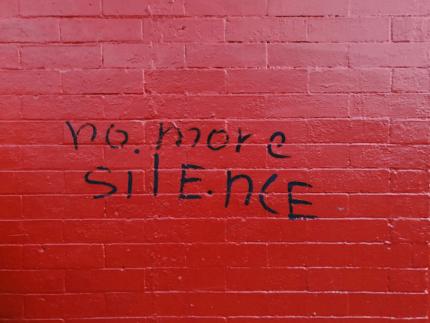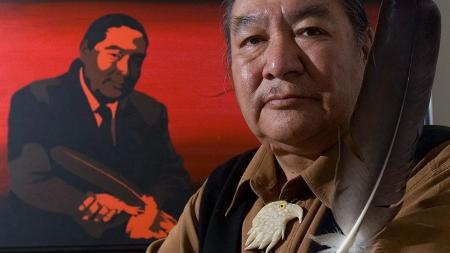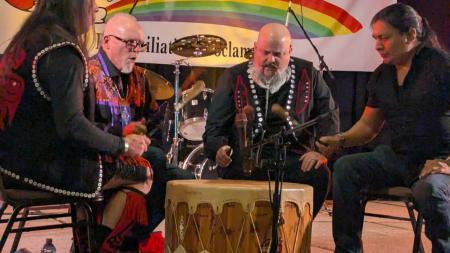Interrupting Silence

This blog shares a story of domestic abuse and molestation. To protect the anonymity of my courageous interviewee, I have used a pseudonym and she has given me permission to share her story with Do Justice.
Elle grew up the eldest child in a family of 6, with parents who loved her, with a roof always over her head and food on the table, though sometimes she had to double up on the mashed potatoes to trick herself into not tasting the liver on her plate.
Elle grew up in a home with a mother who loved the Lord Jesus fiercely, who was strict but faithful to her husband and her family; a mother who was taught to obey your husband no matter what. She had a mother who was taught to unflinchingly obey the Lord and give up your troubles to Him and your husband only. Her mother was taught she should never share her story to anyone and to stay quiet and listen to the patriarchs around her.
Elle grew up in a home where her friends, teachers, and church family didn’t know what was happening on the other side of the front door. They didn’t know or didn’t ask and didn’t reach out. Her mother didn’t dare tell anyone that her beloved husband was not only unfaithful in his marriage, but also physically abusing her, with innocent Elle down the hall privy to the sound of violence and the aftermath after every time her father drank too much.
So Elle didn’t tell, didn’t speak, tried to let it go.
Elle’s mother felt trapped in this cycle until the violence became too much and she lost her 5th child; until her mother whisked all four of her children away and raised them on her own, doing the best she could with what she had. Did her family, friends, and church know why she left? Did they support her? Did they offer refuge? Did Elle’s mother finally speak out? The answer is heartbreakingly no. Her story continued to be untold, however, the trauma and dark memories continued to play in Elle’s mind and heart. Elle had learned from her mother to stay silent and not to expect anyone to reach out and save her. This pressure to keep the darkness continued. When Elle came forward to her mother that a distant family relative was molesting her, the importance of silence and giving up our troubles to God alone was repeated by her mother. Don’t tell. Don’t speak. Let it Go. So Elle didn’t tell, didn’t speak, tried to let it go.
Although Elle never saw that family friend again, her understanding that it was better to keep things hidden never went away. Fast forward to adulthood, Elle had a lack of confidence and hidden trauma she carried with her. She found herself married to a man that would end up unfaithful and physically abusive to her. She didn’t tell anyone about this either. Praise God, that relationship didn’t last very long and Elle was able to move on. She never told any of her stories or the story of her mother’s years of domestic violence for decades.
Still these decades later, Elle has carried that fear and shame with her. She still has trouble feeling comfortable and accepted in a church setting, where she worries the church may not be a safe place to be herself. She worries the church is a place where the dark parts of our lives can’t be revealed and where there isn’t refuge and support. She may sit in the pews from time to time but she emphasizes how oftentimes she doesn’t feel confident or comfortable bringing her troubles to the church. She’s not able to be prayed for, prayed over and sometimes she is too afraid to even silently pray to our Lord Saviour. Elle wants her story to be told now so that other women can safely interrupt the silence of domestic abuse and where churches can learn and grow to be a safe and knowledgeable place to support women who are experiencing or have experienced domestic violence.
Providing a safe culture for people to come forward involves equipping spiritual leaders of churches to be aware of and in contact with local resources.
A 10 year study of Christian Church Support for Domestic Violence Victims conducted in 2005 to 2015 was published in the Journal for Interpersonal Violence, and concluded that “ Religious beliefs play a significant role in the lives of victims of domestic violence. Victims find strength in their faith and would rather endure the violence at all costs to keep a family or a marriage together, than to compromise their faith by leaving.” This may have played a role in Elle’s mother’s belief to try and stay at all costs and to not speak out. That same ten year church study emphasized that members of the church want church leaders to become more educated in abuse awareness and response and the role faith plays in that and to remove the silence on these issues. Providing a safe culture for people to come forward involves equipping spiritual leaders of churches to be aware of and in contact with local resources.
Back in 2021, CRCNA Safe Church provided a webinar called: Faith Leaders and a Coordinated Community Response to Domestic Violence. The webinar highlights how to address domestic violence in your church, including how to recognize, respond and refer. The author(s) point out that unfortunately churches oftentimes avoid issues of abuse. The webinar provided important recommendations for church leaders nicely summarized in an CRCNA News article which highlights:
- If the Pastor/religious leaders of a church are perceived to be supportive, respectful, nonjudgmental and knowledgeable, then it is believed to be more likely someone experiencing domestic violence will disclose the abuse.
- If your Pastor preaches about domestic violence from the pulpit, and if there is information that can be found in the church, such as posters, literature in the library or pamphlets available, and if there are discussion groups or other church-wide initiatives in place, then this is when the conversation about domestic violence is easiest.
- The authors point out the importance of not asking someone about domestic violence unless the setting is private. As mentioned above, there needs to be a respectful, supportive, nonjudgmental, knowledgeable and also a confidential atmosphere present for the person to feel like they can come forward.
- Lastly, it’s encouraged for the church leaders to be well connected and aware of service providers in their community, such as local women’s shelters, crisis centres, children’s aid societies, counsellors and trauma services, etc.
Does domestic violence ever get preached on from your pulpit?
If Elle’s church had had leaders knowledgeable in domestic and sexual abuse and were open to discussing it on the pulpit, would they have felt more comfortable coming forward? If her church had had a committee in place where compassionate and nonjudgmental safe church members offered resources and support, would Elle or her mother have felt comfortable coming to them? If her church had crisis and support information privately available in bathrooms, would Elle and her mother have used them? Elle says yes.
Does domestic violence ever get preached on from your pulpit? Does your church have readily available resources for women experiencing domestic violence and other forms of abuse? Is your church equipped with knowledgeable church leaders to handle someone coming forward with allegations against their spouse, a friend, a church leader? Would you consider your church a safe place for those experiencing abuse?
Consider developing a safe church team, if your church doesn’t already have one, that includes a safe church policy entailing definitions of abuse, mandated reporting for child abuse, which can include emotional abuse from exposure to domestic violence, incident report forms, how to respond to allegations of abuse and a point person or confidential reporting tree within the safe church committee and executive council. Consider having a list of resources available in women’s washrooms and other posters in your church. Offer a section in your library on domestic violence and other forms of abuse, and offer counselling services paid by the church, such as the Counselling Assistance Program (CAP). Host community presentations in partnership with the local women’s shelters and other service providers in your community. Encourage church leaders, council and your safe church members to take part in training and education in abuse awareness and response.
I would like to thank Elle for having the courage to share her life stories with me and with you in this blog. I acknowledge her strength and resilience in promoting awareness of domestic violence and child abuse and for seeking a deeper and clearer relationship with God and His plans for her life. May his light continue to shine light in the dark and restore justice, dignity, and healing for all those involved in domestic violence.
If you or someone who know is experiencing domestic violence, you can reach out to your local women’s shelter, call a crisis line, contact your local police department, or reach out to your safe church leader/coordinator or Julia Rathbun from Thrive’s Safer Churches at [email protected]




